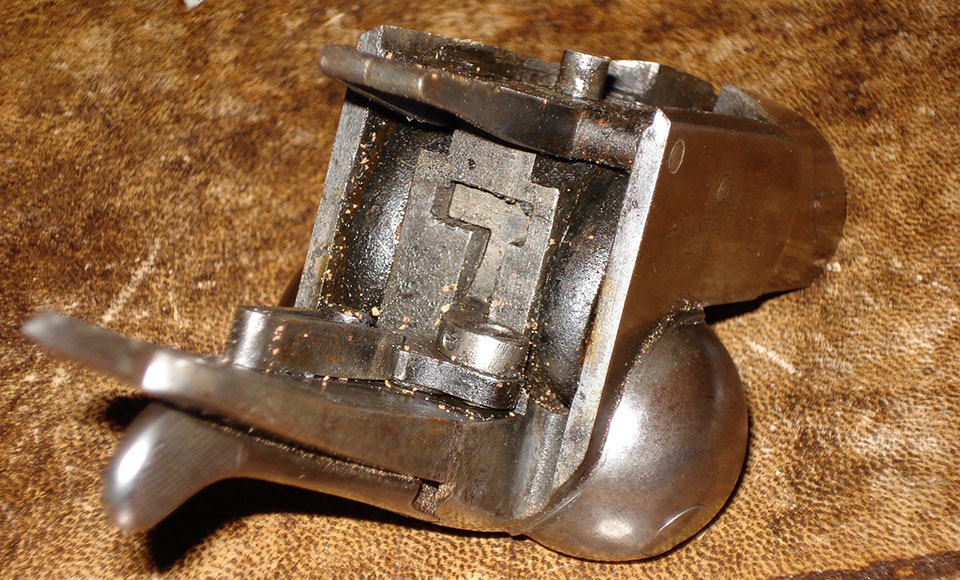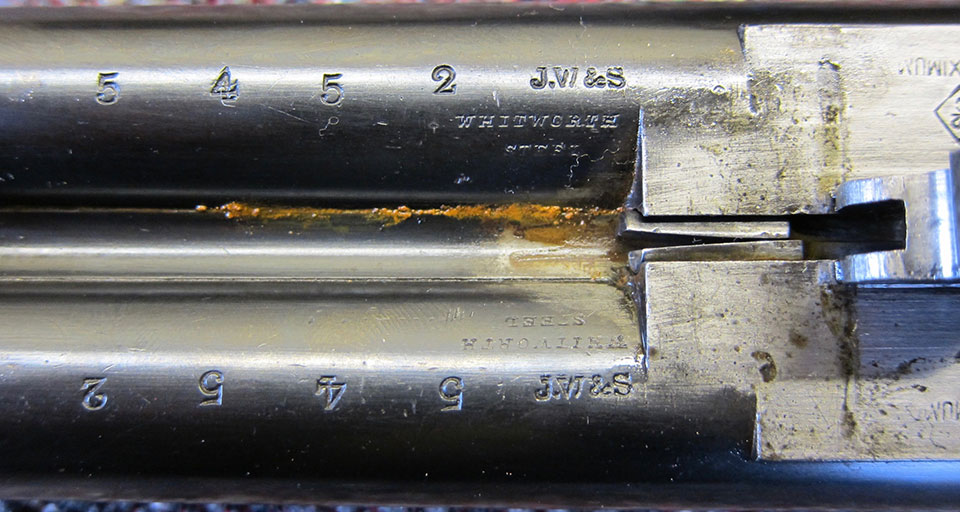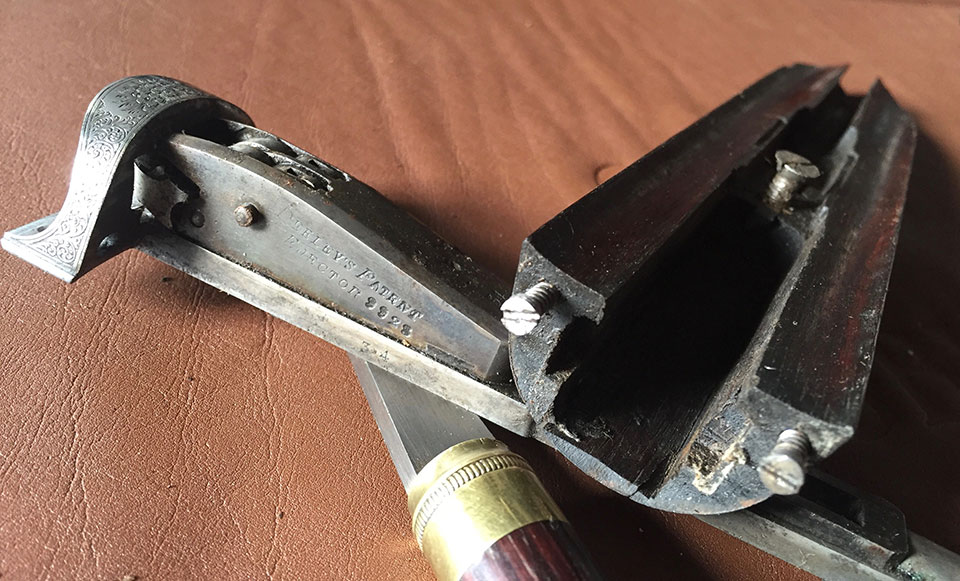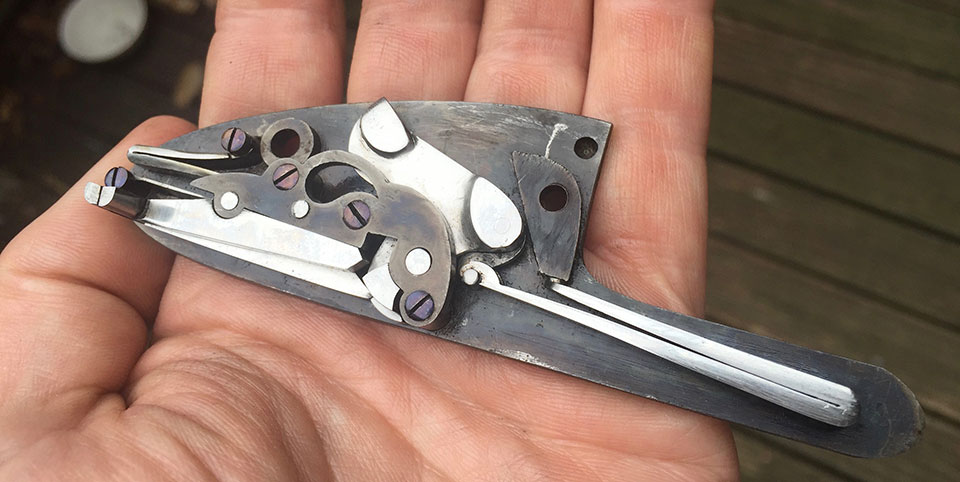Were you out shooting in January? Did you notice the odd niggle with your gun? Perhaps the top-lever felt a little slacker than usual but still worked. Maybe the ejectors failed to eject every time or the gun got a bit hard to open when hot. Was that a bit of a wobble you felt in the hand when you slammed the gun shut?
These and other minor issues are the sort of thing sportsmen notice while they are shooting but the gun continues to go bang. The temptation to carry on is the easy option and the one most people will take. You limp on to the end of the season and then the gun goes back in the safe until next September. Relief, you made it!
 Unburned powder, dusty and dry. This Greener mechanism is ready for a strip and clean.
Unburned powder, dusty and dry. This Greener mechanism is ready for a strip and clean.
There is a skiing trip mid-February. Before you know it, Easter is upon you, then school holidays beckon and the in the heat of the summer the shooting season looks a long way off. Your gun is the last thing on your mind. Invitations start to arrive in May; you vaguely remember you were thinking of getting the gun looked-over but it is not a priority; what with hungry trout to catch and the BBQ to light.
September arrives and out comes the gun, into a slip, into the car, off to the hotel, out on the peg, over comes a partridge, clean kill, near miss, open gun, re-load, close gun, top lever won’t move back, gun gapes helplessly as birds pour over your head and you wander back to the Gun Bus a little shame faced and show everyone the problem, which someone identifies as a broken top-lever spring.
It could as easily have been ejectors not firing, an extractor leg jamming open, the single trigger failing to fire the second barrel, the safety sticking on, the forend falling off. You name it, it happens to guns up and down the land on the first or second day of every season.
So, you have to borrow a Baikal that doesn’t fit you from the ‘keeper for the rest of the day, shoot horribly and go home in a foul mood. You pick up the ‘phone to your gun shop and ask if he can fix it by next week, when you have a big day to attend.
 The bottom rib on this Woodward is starting to leak.
The bottom rib on this Woodward is starting to leak.
The answer is that you’ll be lucky to get it done before Christmas. Amazingly, you are not the only person to have a malfunction early in the season and there is already work on the bench from jobs taken on in the summer. “But can’t you slip it to the front of the queue as an emergency, just for me?” Short answer, “No”.
To move yours to the front means stopping work on a job that someone else bothered to bring in on time and it is his turn now. Why should he suffer? He wants his gun too.
Now you are very cross, you are gong to have to borrow a gun for half the season, or buy a stop-gap. Why didn’t you pay attention last January and get it into the workshop in February? There is no excuse you can drudge-up that will make you feel any better; you just forgot, along with most of the sportsmen in the country. That is why you are where you are.
 A proper strip and clean includes the forend and ejector work.
A proper strip and clean includes the forend and ejector work.
Now, re-wind back to the end of last season. What you should have done was to make a clear note of all the little imperfections you noticed with your gun during the season. Take the gun to the gun shop and have a chat about it, leave your notes with the gun and expect it back in a couple of months with a clean bill of health.
Now you can put it back in the cabinet secure in the knowledge that it isn’t dirty inside and rusting away while you sunbathe, that little cracks are not about to become breaks or a bit of looseness translate into mis-timed ejectors or a severe rattle a month into next season.
Gunmakers have been trying to get their customers to take their gun is for end-of-season service for a century or more. It is good practice, and oft-given, but more often unheeded, advice to have your gun serviced by your gunsmith at the end of every season. A basic strip and clean will remove any residue in the locks and action from gas blow-back from cartridges with weak primers. It will also remove any dust or damp grit and the like that has entered through the striker holes or trigger plate or by condensation or rain.
 A properly cleaned lock.
A properly cleaned lock.
A slightly loose action can be tightened up, a little rust or lead residue, or fouling from plastic wads in the barrels can be polished out. Attention can be paid to any weakness in the rib solder or any small dents the barrels may have suffered. Pins or screws that have worked a little loose can be tightened and any small cracks in the woodwork can be attended to. Out of time ejectors can be regulated easily if the problem is just emerging. All this is ‘stitch-in-time’ maintenance and ensures decades of trouble free shooting.
Don’t be like the man who brought his gun to me and received an £800 bill who said, “Well, I haven’t serviced if for at least ten years, so at £150 per year for servicing, I’m ahead.” His gun would be in better shape had he not let it get so loose and corroded.
So, this year, get ahead of the pack and take your gun in for a service immediately the season ends. You won’t regret it.